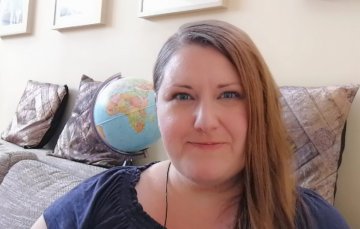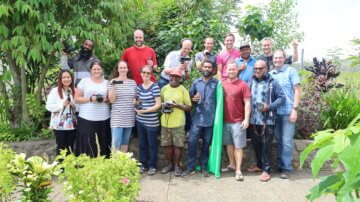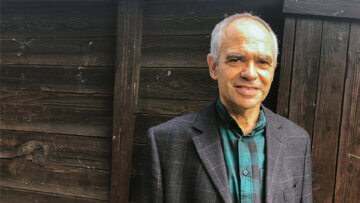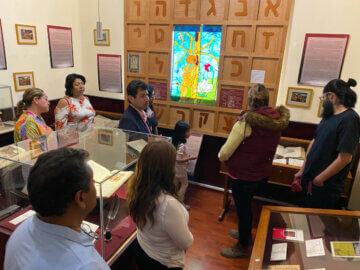Alliance Organisations Continue Focus on Ukraine
Now in its fifth month, the war in Ukraine continues to upend life and ministry all over eastern Europe.
Wycliffe Global Alliance organisations in countries neighbouring Ukraine have been working with local churches to care for refugees’ physical, emotional and spiritual needs. With no end in sight to the crisis, leaders are assessing long-term needs while still providing emergency food, clothing, shelter and transportation.

Ruben Dubei
Ruben Dubei, director, Wycliffe Romania:
“I believe one of the reasons God brought them here is for us to be ... first to help them materially and physically with all they need, but to also serve them spiritually.
“It looks like that first fire for the refugees is going down a bit. Not as many refugees are crossing into Romania now, or transiting through Romania these days. Some of them have gone to the Western countries. Others have settled in Romania and others are waiting to move back. The refugees that are still here with us, the church has continued to help them, assist them as long as they need until they move back home. If they settle, they find a workplace.
“At least for us Romanian Christians, it has been a time to put in practice what we have been learning and listening to over the years. God gave us some work to do, to demonstrate our love and our empathy for the refugees.”

Zsuzsa Zentai
Zsuzsa Zentai, director, Wycliffe Hungary:
“We were waiting for a quick solution. We hoped for a quick solution. But everybody came to the realisation that it’s not going to end so soon. There are economic effects of what’s going on, and spiritual. … Prices are going up everywhere. It’s really a big pressure on everybody, and on churches also as well as society. So it’s not an easy situation. But you know, we are in God’s hands. He provided through different crisis situations before.
“We need more faith to see how he provides, not just looking at the numbers or the situation. We have come to that point where now this is the new norm. We need to get used to that. We don’t know what will happen the next day.
“The whole story is really in God’s hands. He knows what he is doing.”

Agnieszka Domagala
Agnieszka Domagala, director of Biblijne Stowarzyszenie Misyjne (Wycliffe Poland):
The war has not gone anywhere. It’s still here. We cannot tell ourselves, OK, it’s three months long. I have had enough and I can go back to my life. War will bring a huge change to our country. We don’t know what kind, what our government is doing, adjusting different laws. There will be issues with jobs and taxes, approving qualifications and diplomas for doctors and nurses and other people. So there’s a lot of issues. And even when the war is over, not all the people will be gone. So it will be a big change for the next quite a few years.
“We have a huge number of refugees. Huge. It is so difficult for them to find a flat. Every one we find is a miracle for us. My hometown where I live, before the war we had 600,000 citizens. Now we have 300,000 more. How can you make room for such a number of people? It is impossible.
“It is a bit less, but still it is a stream of people. Yesterday I read the statistics that 22,000 people crossed the border into Poland. But there are also a lot of people going the opposite direction. Some are going back to the zones which were not affected by the war. The mayor of Kiev is telling people, “Please don’t come yet. Not yet.” But people do. These are personal decisions. They are very difficult, emotional decisions. Some people have nothing there, and they say, “Well, we will start our new life in the West.” Some have nothing there and they say, “We will go back and rebuild everything.”

Jaroslav Tomašovský
Jaroslav Tomašovský, director of Wycliffe Slovakia:
“There are two groups of Ukrainians in Slovakia at the moment. (First are) the ones who came because the conflict situation was uncertain. People, especially children, were scared, so mothers would leave even parts of Ukraine that were far away from the front lines. These people are now thinking of returning. Especially mothers with kids, if their husbands are back in Ukraine, so they are considering going back.
“But there are other people, and these are from the second and third wave, who actually escaped because the situation in their region got tough. They even lost their houses. These people don’t expect to go back soon because they don’t have a place to go.”
Delivering supplies
From Poland, BSM has trucked more than 50 tons of food into Ukraine. Driven by volunteers, their lorries (transport trucks) usually go as far as Lviv, about 70km inside the border. Ukrainians meet them there and then transport food all over the country—though a growing petrol shortage makes this increasingly difficult. “They are so thankful that anybody is coming with supplies,” Agineszka says, “because the needs are actually growing now.”
BSM also is delivering food to neighbouring Slovakia to help Roma churches there who have received Roma refugees from Ukraine.
“As an organisation we are really small,” she adds. “But because of the generosity of people in Poland and from different countries, we really had a lot to put into this transport. Our donors were Germany, France, U.S., Australia, Austria, Switzerland—whoever thought, I have friends in Poland. The Wycliffes also. Wycliffe Australia, Wycliffe Netherlands, Wycliffe France. They had members in different churches so they were spreading news. So we were receiving money from all over the world. It was, and is, just amazing.
“In many, many cases we just see the heart of people. It’s still existing among the Polish people, this sense of urgency and helping.”
Even in areas where Russian attacks have subsided, the situation across Ukraine is growing more desperate.
“People have lost their jobs and they don’t have money,” Agineszka says. “So although there are some supplies in the shops not in the war zone, people don’t have money to buy them. When they have no jobs, they just depend on humanitarian aid. We already know that it won’t just be when the war is over. It will be long, long after.”

Loading delivery vehicles bound for Ukraine. BSM Photo.
Trauma healing
Jaroslav, Wycliffe Slovakia:
“We started a trauma healing workshop online. It’s a pilot workshop, and the goal is to train at least three or four people who can start workshops like this for others.
“We have learned, especially in the beginning of this crisis, that people live on adrenaline. They are still kind of thinking, It’s bad. We need to save our lives. But after a while, the adrenaline disappears and then they start to suffer because of the trauma they went through.
“Sometimes they need special help. Sometimes we can help just by being able to listen to these people and confirm their feelings and just be with them. This is something that not everybody knows how to do. So it would be good to find a way to do the trauma healing workshops in large scale, so people would be trained and prepared for what will come in the near future. And it will, because these traumas are there. We already can see mothers are not understanding why their children are behaving strangely, wildly."
Ruben, Wycliffe Romania:
“We taught a trauma healing course in partnership with the Bible Society of Romania. People who work in various organisations that help with refugees, or from churches, have been trained to know how to help the refugees. About 25 or 30 people attended this workshop in May.”
Zsuzsa, Wycliffe Hungary:
“The first trauma healing workshop has taken place and the second one will be taking place during the autumn. We have more people in churches interested in that. Two members of Wycliffe will facilitate this.
“For a small team, this is what we could arrange. But it is also a huge thing. We heard very good reports. We cannot take on doing the trauma healing workshops ourselves. We are too small. But to do that with the church, this is our vision.”
Agnieszka, Wycliffe Poland:
“We are printing and distributing the American Bible Society’s Beyond Disaster materials in Russian and Ukrainian. We already printed the Russian and Ukrainian materials, and we are now distributing those. We also translated a Polish version, which is at the press now. It’s very simple material for self-study or small groups. There are questions to encourage you to know that you are actually normal when a lot of difficulties happen and you have emotions and you need to think it through and analyse and notice how you behave.
“For trauma healing when you need to have a leader of the group, it would be much more difficult because you have such a huge wave of refugees that we wouldn’t be able to reach them. So we decided on self-reading materials. In my town (Wroclaw) there are a few humanitarian aid distribution points led by Churches. So when people come for food and supplies, they also give them this booklet.”
Bible app help
Cards developed by Wycliffe Hungary give a QR code from Faith Comes By Hearing, pointing people to Bible apps in their language. The cards have been widely distributed and translated for use among Ukrainian refugees and people caring for them in several countries.
“I only have just a few left,” Zsuzsa says. “I think at least 10 different organisations distributed it. Other partner organisations, churches. It was really just a little thing, but it has a good impact. God is really using it. 10,000 copies were distributed in printed form, but the online version is everywhere.”

Front and back of a card directing Ukrainian refugees to Bible apps in their languages, along with an image of the phone screen the QR code brings them to.
Prayer
Jaroslav, Wycliffe Slovakia:
“We really need God’s wisdom and guidance in this situation, how to advise these people. Some of them really want to go back. We are not sure if they are actually aware of the danger that is still there. ...
“One other prayer request would be to help those who lost their homes to find new friends and a place where they can feel safe and they can live, at least for a few years. So we can create a sort of home for them. That they would feel welcome and really have new friends, new spiritual families.”
Ruben, Wycliffe Romania:
“Pray for a group of about 50 that our church is caring for, mothers with disabled children. They have different health issues. They had been in contact with an organisation that was helping them, and when they came to Romania they put them all in the same train. They didn’t know each other before coming to Romania. They got to know each other here, or on the train.
“They’ve been here in Oradea about three months. A community has developed among themselves. They’re like a family. So I think that has helped them go through this period of time. They started coming to church. Sometimes we organise special programs for them. Or we go to them - to the campsite. And they are very open to the gospel. Some of them came for the second program, so that showed us that their hearts are open to receive the gospel. We pray that some will even get baptised during the summer.
“But anytime I meet them and get to talk to them, they say they would like to go back.
“Also pray for the Deaf groups that have come to Romania. Some have found places to work in the cities and some are thinking to move back soon.”
Zsuzsa, Wycliffe Hungary:
“Just to deal with this pressure and to trust God in whatever is coming. Pray for the trauma healing, that we would be wise and see what is our part and how we can best serve the churches and the refugees through that. We want to serve them through the churches because I think that is the best way.
“And of course, for this little (QR code) card. We are praising God for this very good reaction to that. Pray that his Word would really talk to people’s hearts.
“Pray that we will be resilient. We have a shortage of personnel in our office. And our members have started travelling again. Now, some members will be coming back home and they need to meet with churches. It won’t be so easy. Raising support for Bible translation is harder, because now everyone, all the churches, want to respond to the crisis. We also want to help and we also want to invest.”
Agnieszka, Wycliffe Poland:
“For the Polish people, that they will stay the way they are. I would love to see that we may be tired, but we did not lose the spirit of generosity and readiness to help. Pray for strength, wisdom and good attitudes for volunteers.
“And for our refugees. For people who are staying in Poland, that they will go through this emotionally difficult situation somehow with hope. And that they will survive this and that God will help them to stay healthy emotionally, psychologically. And also that they will find love. Now people are amazingly open to the gospel.
“All over Poland, all organisations and churches are producing all kinds of (ministry) materials. And they all are well received. So there is openness among Ukrainians who are not believers. Pray that Christians remain light—and on the Ukrainian side, that they will accept the light.”
•••
Story: Jim Killam, Wycliffe Global Alliance
The latest
View all articles
Informing, teaching, inspiring: PNG workshop teaches video storytelling for language communities
PNG workshop teaches video storytelling for language communities
Read more
Looking ahead at 2024
As the year unfolds, we marvel at the work of God in our rapidly changing world. And, we look forward to a number of gatherings and conversations intended to draw us together.
Read more
Telling the Bible's Story
It may come as a surprise that a museum is among the Wycliffe Global Alliance organisations.
Read more